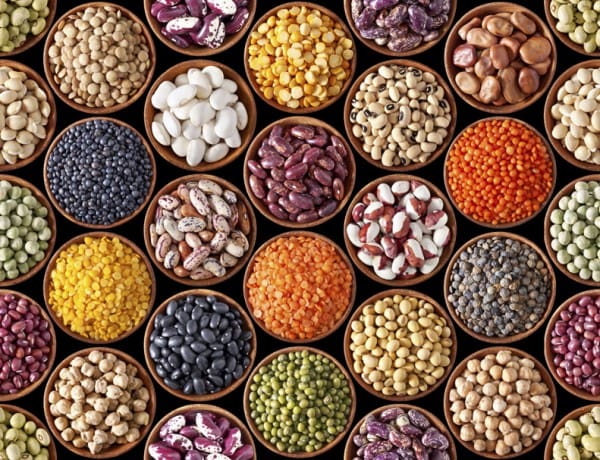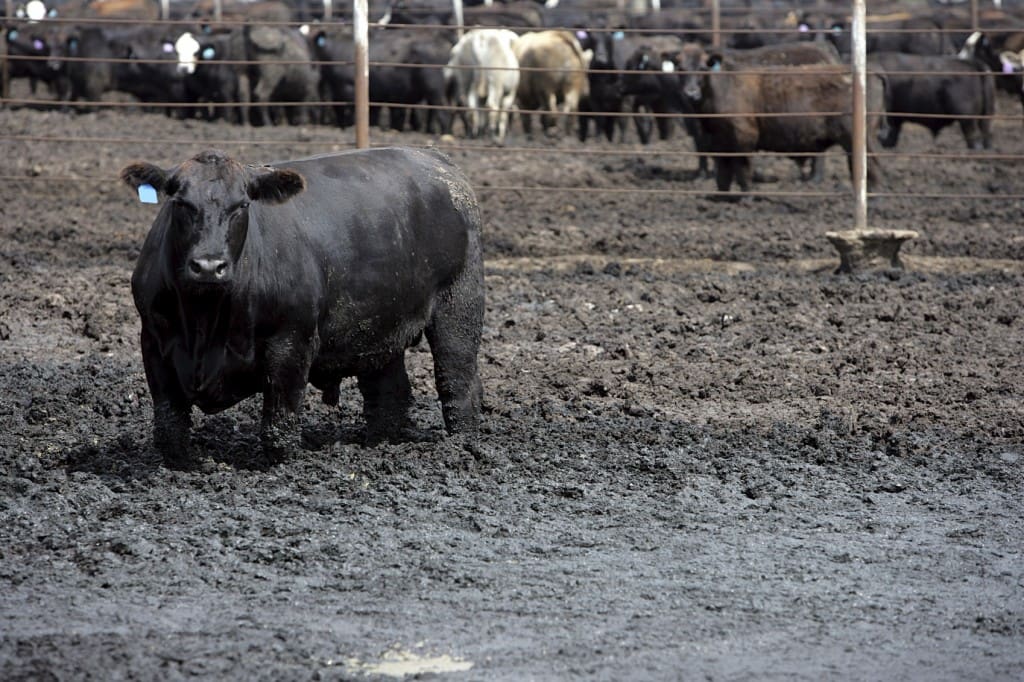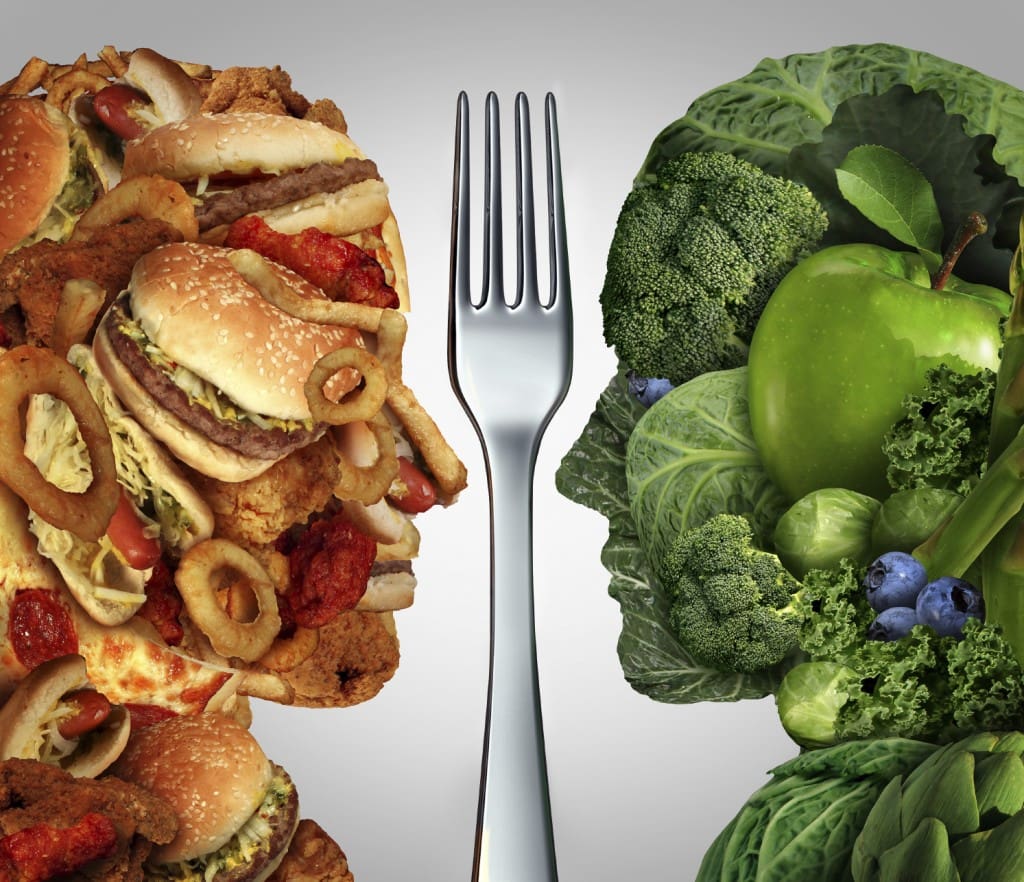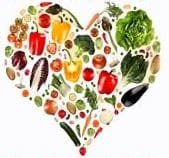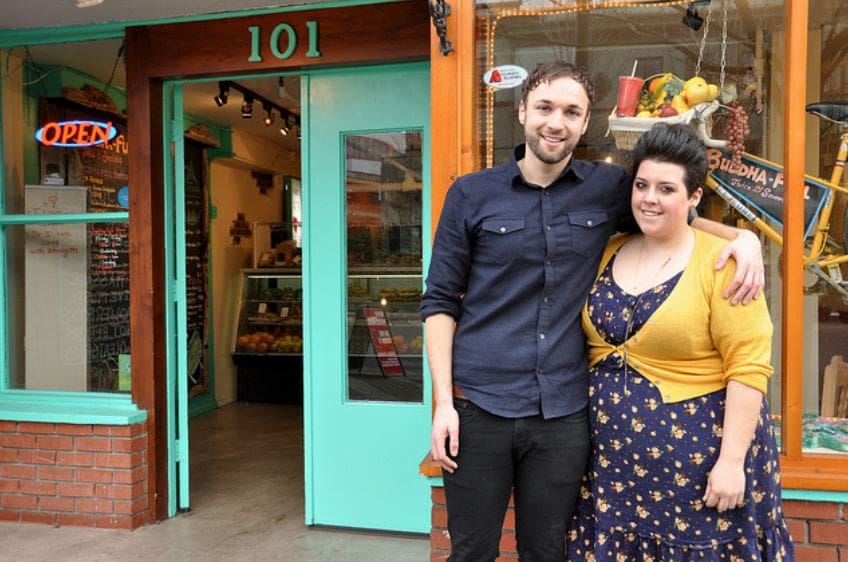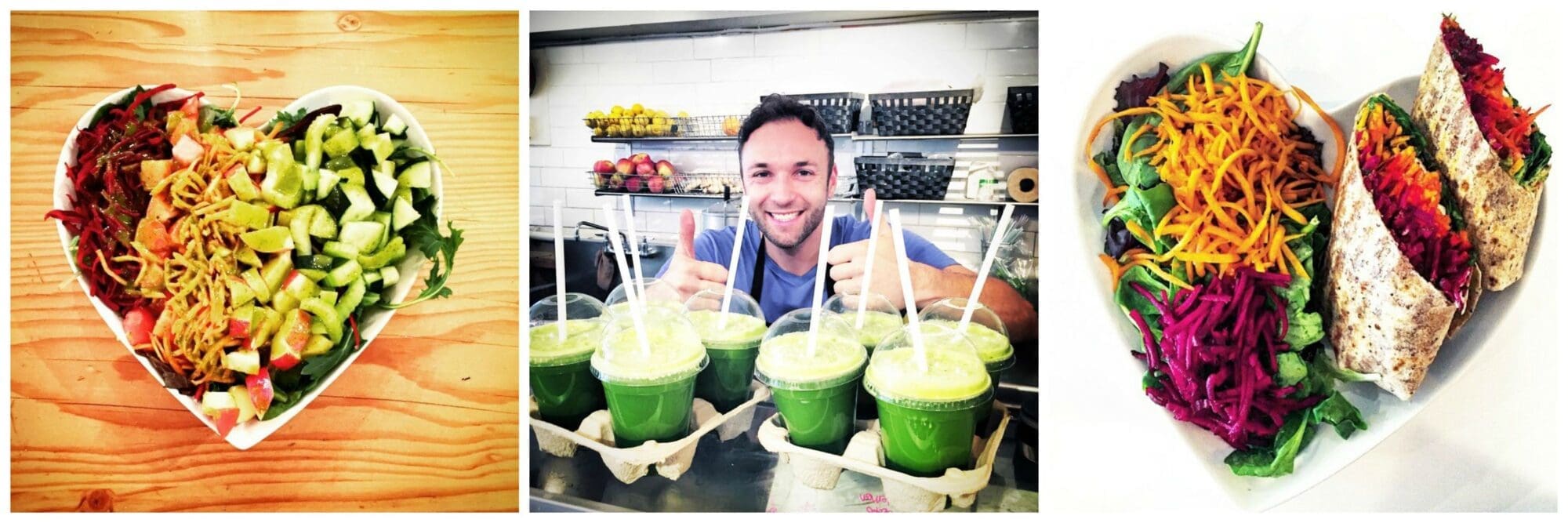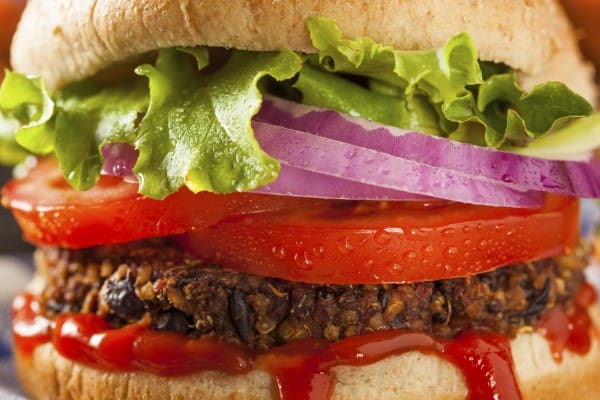
.
But don’t look to ‘lab meat’ for a solution
.
Guest post by David Steele
There is a promising trend in food these days. Meat substitutes are on the rise. More and more plant-based meats that look and taste like their cognate animal products are coming to market. They have been in the news big time lately. The New York Times, The Guardian, Time Magazine and Slate are just a few of the publications that have run feature stories in recent months.
Most recently, the New York Times’ Nicholas Kristof wrote effusively about the latest products. High in protein and other nutrients, these plant-based meats, Kristof tells us, are nearly indistinguishable from cooked animal flesh. What a wonderful development! As The Guardian bluntly states, modern animal agriculture is one of the worst crimes in history. Soon, just maybe, we’ll be able to consign that crime to the past.
The vast majority of animals raised for meat, eggs and dairy today are raised on factory farms. Debeaking, tail docking, castration, even tooth cutting – all without anesthetics – are standard practice. Dairy cows have their calves taken from them within hours of giving birth. Egg laying hens live six or eight to a cage; each has less than a standard 8½ x 11” sheet of paper’s ‘floor’ space to her. Pregnant and mother pigs live individually in cages so tiny that they can’t even turn around. As the Guardian article points out, “The fate of animals in such industrial installations has become one of the most pressing ethical issues of our time.”
And the severe problems don’t end with the animals’ hellish lives. Raising livestock and the grain and soybeans to feed them is easily the biggest contributor to rainforest destruction; credible analyses indicate that animal agriculture is responsible for roughly 15 to 25% of global warming. And animal agriculture is grossly inefficient.
As Cornell University’s David Pimentel calculates it, the way we raise meat, it takes some 28 calories of fossil fuel to generate one calorie of food value. This is enormously wasteful. And worse, because so much grain and soy is fed to animals instead of humans, the price of basic staples is raised, pricing out hundreds of millions of the world’s poor (see, e.g., this book review). In effect, we’re throwing away the majority of the protein and calories that humans could have taken in. Clearly, we can’t allow this to go on. Not for long, anyway.
In step the meat substitutes
That is why the appearance of ever more meat substitutes is such a very good thing. As Kristof says, “If the alternatives to meat are tasty, healthier, cheaper, better for the environment and pose fewer ethical challenges, the result may be a revolution in the human diet.” And he may very well be right. Tech giant Google wanted to bet big time on it this summer. They made a $200,000,000+ offer for one of the new startups – Stanford biochemist Patrick Brown’s Impossible Foods. Brown’s product won’t even be out until next year! Google, by the way, was turned down; Impossible Foods has raised $108,000,000 on its own instead.
Dr. Brown’s big innovation? He’s adding plant-derived heme to his new veggie burgers. Heme, he argues, is responsible for much of the flavour of meat. If Google’s interest in it is any indicator, he’s probably right. His products will join those of Beyond Meat and the older Tofurky, Yves, Gardein, Field Roast, etc., etc., etc., on store shelves soon.
All of these substitutes for animal products save animals from horrific lives and reduce the environmental footprint of our meals. There are other products on the horizon, though, that are nowhere near as beneficial. They are not even benign.
“Lab Meat”
Mark Post and colleagues at the Maastricht University in the Netherlands and New York City’s Modern Meadow are attempting to make meat outside of animals’ bodies. Beef seems to be their main goal for now. This is not artificial meat, per se, but rather meat made by growing cells taken from animals. On the surface, it sounds like a great thing. But, when you dig deeper, you see that it is nothing of the sort.
The first lab meat burger was made, cooked and eaten a couple of years ago. Constructed from 20,000 tiny strips of muscle cells, the thing was reportedly on the flavourless side and cooked up well only with the liberal use of butter. It was lauded by Peter Singer, author of Animal Liberation, as the world’s first cruelty-free burger.
Unfortunately, in this case Dr. Singer was wrong. Immense cruelty went into it – and goes into the continued work on it and its competitors.
Lab meat is made by taking cells from the bodies of living animals and growing them in a liquid medium. The end result is short strands of muscle-like tissue that are then stuck together. Post, at least so far, manually assembles them; Modern Meadow is trying 3D printing.
Growing those cells requires serum. Serum is the liquid left over when all of the cells are removed from blood. The serum used to make these burgers comes from fetal calves and, in later stages of the cells’ growth, from horses. Fetal calf serum is ‘harvested’ by killing a pregnant cow, cutting her still living calf from her belly and then puncturing the calf’s still beating heart. About 1 litre of serum is obtained from each calf. Producing those 20,000 strips in the first ‘lab meat’ burger probably required hundreds of liters of the stuff. That’s hundreds of fetal calves taken from slaughtered cows … all for one 4 oz. burger.
Modern Meadow says that it gets more meat from a liter of serum but their claim (as stated in The Guardian) of getting 22 lbs of meat per litre is outrageously high. I doubt very much that anyone with any experience in tissue culture believes that they’re really getting even a tenth of that. My guess would be more like a fiftieth. In any case, if one wants to grow ‘meat’ in the lab, one needs the serum.
And, sadly, the prospects for doing away with that serum in the process are bleak. Serum contains enormous numbers of growth factors, hormones and proteins necessary for cell growth. Expert scientists have been trying for decades to come up with an alternative but so far none matches serum in promoting cell growth and all are wildly more expensive (in dollar terms, at least) as well.
Still, you might say, it’s not nice to animals but it must be better for the environment. You might cite the paper that says so. It loudly claims that ‘lab meat’ would require 99% less land, 82-96% less water, even 7-45% less energy than meat produced from animals raised in Europe.
True, that paper is out there. It got a lot of publicity. Unfortunately, it also is just about the worst example of a failure of peer review that I have ever seen. The study is deeply flawed. Its assumptions are highly questionable, to put it mildly: i.e., that the meat would be raised as free cells in unheated vats, that 80% of the water used to grow the cells would be recycled without treatment, and that the cells would be fed entirely with cyanobacteria. None of these assumptions are even close to realistic.
There is not the slightest chance that meat can be grown like that. Instead, the complex mix of nutrients, growth factors and hormones found in fetal calf serum will be required. The media will have to be heated to a constant 98 or 100 degrees Fahrenheit (37-38 degrees Celsius) for the cells to grow; oxygen will have to be delivered and waste products constantly removed. Reusing even 1% of the water without treatment is extremely unlikely.
And, because there is no immune system in cell culture, large amounts of antibiotics and antifungal drugs will be needed to keep the growing meat from being over run with germs. The possibility of viral infections will be high.
Beyond those problems, growing something that approximates the beef or pork or chicken that people expect will be a daunting task. The meat that Mark Post is producing is only 100-200 micrometres (1/250th to 1/125th of an inch) thick and roughly an inch long. It is nothing like what most people would call meat.
To grow a steak or a piece of chicken will require some sort of degradable scaffold with a complex vascular system capable of bringing food and oxygen to the growing cells and taking waste and carbon dioxide away. 3D printing may help, but it’s hard to imagine a meat anything like what people think of as meat emerging from this process. (I suppose that it might be pulled off by putting the animal cells into one of the excellent plant-based meats, but what would be the point of that?!).
All in all, this seems insane. It is true that animal agriculture needs to go. But it does not make sense to attempt to replace it with an enormously expensive high tech system that, if it does work, is highly likely to require major inputs of blood serum. There is little chance, even, that a venture like this will ever be economically viable.
And there’s no need. If one feels the need for something that tastes like meat, there are already plenty of plant-based alternatives available. Field Roast, Gardein, Tofurky, Yves, etc. As noted above, ever more flavourful alternatives are on the horizon.
By the way, there is a new cheese alternative on the horizon, too. This one will even have plant (actually, yeast)-based casein in it. The cows’ milk protein has been engineered into the yeast. It’s not as scary as it sounds.
And, if you must eat meat, do the responsible thing. Eat the plant-based stuff.
David Steele is a molecular biologist retired in 2013 from the Faculty of Medicine at the University of British Columbia. He has also held faculty positions at Cornell and Queen’s Universities. Dr. Steele has been Earthsave Canada‘s President since 2009. He is also a regular contributing writer to the Earthsave Canada newsletter and an occasional contributor to various other publications.
